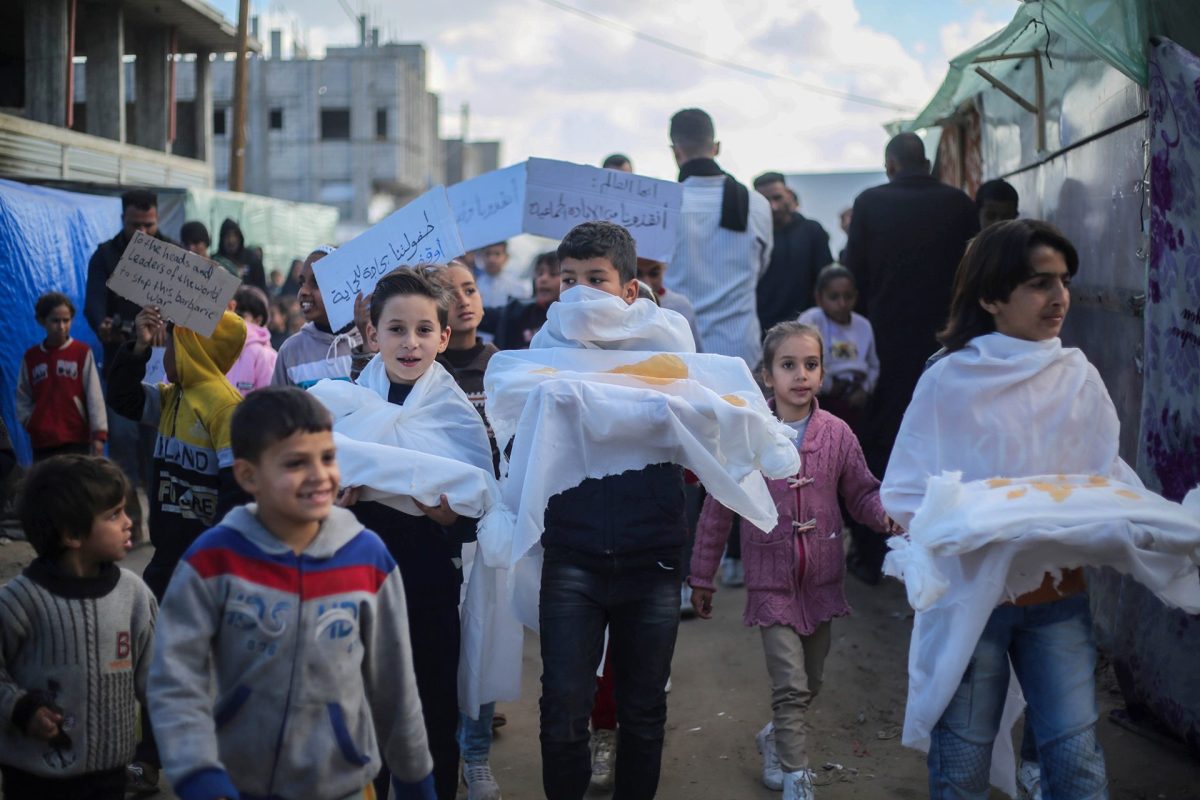The letter was sent amid mounting international calls for Israel to drop plans for a military assault on the city of Rafah in southern Gaza, where more than 1 million Palestinians from the north and centre of the territory have fled seeking safety.
“Given the critical situation in Rafah, Ireland and Spain have just requested the European Commission urgently review whether Israel is complying with its obligations to respect human rights in Gaza,” Pedro Sánchez, the Spanish prime minister, wrote on X.
The joint letter from Sánchez and Leo Varadkar, from Ireland, to the commission president, Ursula von der Leyen, and the EU’s foreign policy chief, Josep Borrell, published on Wednesday, is a highly unusual move, even for the two leaders who have come to be the strongest champions of Palestinian rights in Brussels.
Sources say the letter was designed to prompt Brussels to seek official legal opinion on human rights compliance in the war and add to pressure on Israel over Rafah.
“We are deeply concerned at the deteriorating situation in Israel and in Gaza, especially the impact the ongoing conflict is having on innocent Palestinians, especially children and women,” the letter said.
“The expanded Israeli military operation in the Rafah area poses a grave and imminent threat that the international community must urgently confront.”
The three-page letter, which threatens to cause further divisions in the bloc over Israel, has demanded a review of the EU-Israel association agreement that came into force in 2000 and is the main basis for trade ties.
“We ask that the commission undertake an urgent review of whether Israel is complying with its obligations, including under the EU-Israel association agreement, which makes respect for human rights and democratic principles an essential element of the relationship; and if it considers that it is in breach, that it proposes appropriate measures to the council to consider,” the letter added.
The demands, the letter noted, have been made “against the background of the risk of an even greater humanitarian catastrophe posed by the imminent threat of Israeli military operations in Rafah … and continues to occur in Gaza since October 2023, including widespread concern about possible breaches of [international humanitarian law] and international human rights law by Israel”.
Varadkar told the Irish parliament on Tuesday that Benjamin Netanyahu, the Israeli prime minister, was not listening to international leaders asking Israel not to launch an offensive in Rafah.
He told the Dáil there was a “serious risk of a massacre” occurring in Rafah if a ground assault were to occur, adding that Netanyahu was making the situation much worse for his own country in the long term if he insisted on “going down the path they are going”.
Ireland and Spain were among the handful of countries that criticised von der Leyen for her unequivocal early support for the Israeli offensive in Gaza after Hamas’s 7 October attack on southern Israel, which killed 1,200 people. The countries pushed strongly for a ceasefire in an EU leaders summit in October and language asserting Israel’s obligation to comply with international human rights law in the defence of its own country.
Since then, the two countries have become more and more vocal in the defence of ordinary Palestinians. They were also among at least seven European countries, including Luxembourg and Slovenia, who vowed to continue funding UNRWA, the UN agency that supports schools and hospitals across the Palestinian territories, after several large donors backed away after Israel claimed 12 employees had participated in the 7 October attacks. Two UN investigations are under way.
The letter added: “We must not lose sight of the pressing need for a political perspective to end the conflict. Almost 28,000 Palestinians have been killed, and more than 67,000 are injured, and we have witnessed the displacement of 1.9 million people (85% of the population) within Gaza and the wholesale destruction of homes and extensive damage to vital civilian infrastructure, including hospitals.”
“We have repeatedly expressed our total condemnation of Hamas’s indiscriminate terrorist attacks of 7 October and call for the immediate and unconditional release of remaining hostages.”
But, it said, Israel’s right to defend itself “can only be exercised in line with international law … [and] must comply with the principles of distinction, proportionality and precaution”.
A European Commission spokesperson stated it urged all sides to “respect international law, and note that there must be accountability for violations of international law”, adding, “The EU consistently underlines the importance of ensuring the protection of all civilians at all times in line with international humanitarian law. It deplores all loss of civilian life.”
